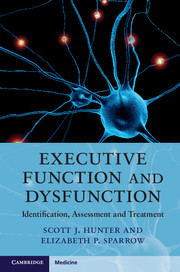Book contents
- Frontmatter
- Contents
- Editor biographies
- List of Contributors
- Preface
- Acknowledgments
- Introduction
- Section I Foundations of Executive Function/Dysfunction
- Section II Executive Dysfunction in the Neurodevelopmental and Acquired Disorders
- Section III Applications
- Chapter 17 Empirical status regarding the remediation of executive skills
- Chapter 18 Educational implications of executive dysfunction
- Chapter 19 Executive functions, forensic neuropsychology, and child psychiatry: opinions, cautions, and caveats
- 20 Reflections on executive functioning
- Appendix 1 Abbreviations used in the book
- Appendix 2 Tests/tasks referenced in the book
- Index
- References
Chapter 18 - Educational implications of executive dysfunction
from Section III - Applications
Published online by Cambridge University Press: 05 October 2012
- Frontmatter
- Contents
- Editor biographies
- List of Contributors
- Preface
- Acknowledgments
- Introduction
- Section I Foundations of Executive Function/Dysfunction
- Section II Executive Dysfunction in the Neurodevelopmental and Acquired Disorders
- Section III Applications
- Chapter 17 Empirical status regarding the remediation of executive skills
- Chapter 18 Educational implications of executive dysfunction
- Chapter 19 Executive functions, forensic neuropsychology, and child psychiatry: opinions, cautions, and caveats
- 20 Reflections on executive functioning
- Appendix 1 Abbreviations used in the book
- Appendix 2 Tests/tasks referenced in the book
- Index
- References
Summary
As has been discussed throughout this volume, EF is a broad term describing the range of skills required for purposeful, goal-directed activity, socially appropriate conduct, and independent regulation of action and affect. EF skills can be considered a “domain of neurocognitive competence” that sets the stage for learning, academic achievement, and rule-governed behavioral functioning. In practical terms, EF involves developing and implementing an approach to performing a task that has not been habitually performed. When skills become overlearned through practice and thus automatized, they require less executive or “top-down” control.
In performance-based activities, implementation of EF occurs after perception but before action, thus involving a preparedness to respond. The central components of EF are those that facilitate a “pause” that occurs after perception but before action, that allows for appropriate response preparation. These components include response inhibition, attention regulation, WM, and planning. Expanded definitions of EF also include problem solving skills, organization of behavior, mental flexibility, set-shifting, and the capacity to delay gratification. These sub-components are considered separable from the specific cognitive domains and modalities in which they are assessed, but are nevertheless crucial to performance, and critical for remediation of learning difficulties of all kinds.
- Type
- Chapter
- Information
- Executive Function and DysfunctionIdentification, Assessment and Treatment, pp. 232 - 246Publisher: Cambridge University PressPrint publication year: 2012
References
- 6
- Cited by



